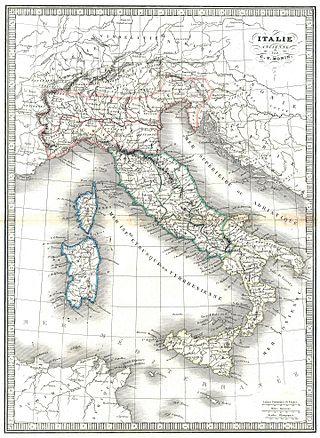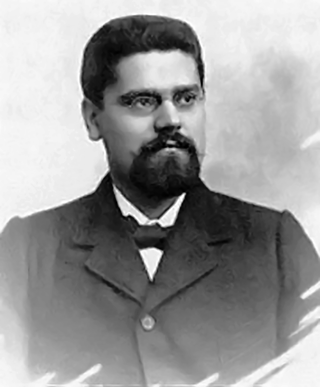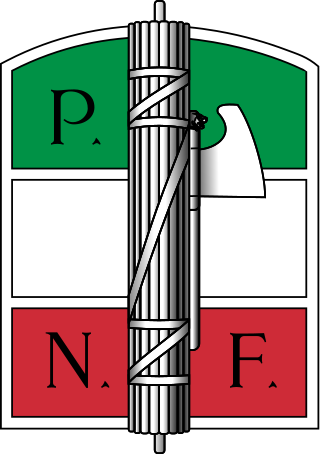
Fascism is a far-right, authoritarian, and ultranationalist political ideology and movement, characterized by a dictatorial leader, centralized autocracy, militarism, forcible suppression of opposition, belief in a natural social hierarchy, subordination of individual interests for the perceived good of the nation or race, and strong regimentation of society and the economy. Opposed to anarchism, democracy, pluralism, egalitarianism, liberalism, socialism, and Marxism, fascism is at the far right of the traditional left–right spectrum.

Giuseppe Mazzini was an Italian politician, journalist, and activist for the unification of Italy (Risorgimento) and spearhead of the Italian revolutionary movement. His efforts helped bring about the independent and unified Italy in place of the several separate states, many dominated by foreign powers, that existed until the 19th century. An Italian nationalist in the historical radical tradition and a proponent of a republicanism of social-democratic inspiration, Mazzini helped define the modern European movement for popular democracy in a republican state.

The unification of Italy, also known as the Risorgimento, was the 19th century political and social movement that in 1861 ended in the annexation of various states of the Italian peninsula and its outlying isles to the Kingdom of Sardinia, resulting in the creation of the Kingdom of Italy. Inspired by the rebellions in the 1820s and 1830s against the outcome of the Congress of Vienna, the unification process was precipitated by the Revolutions of 1848, and reached completion in 1870 after the capture of Rome and its designation as the capital of the Kingdom of Italy.

The European country of Italy has been inhabited by humans since at least 850,000 years ago. Since classical antiquity, ancient Etruscans, various Italic peoples, Celts, Magna Graecia colonists, and other ancient peoples have inhabited the Italian Peninsula.

The March on Rome was an organized mass demonstration in October 1922 which resulted in Benito Mussolini's National Fascist Party ascending to power in the Kingdom of Italy. In late October 1922, Fascist Party leaders planned a march on the capital. On 28 October, the fascist demonstrators and Blackshirt paramilitaries approached Rome; Prime Minister Luigi Facta wished to declare a state of siege, but this was overruled by King Victor Emmanuel III, who, fearing bloodshed, persuaded Facta to resign by threatening to abdicate. On 30 October 1922, the King appointed Mussolini as Prime Minister, thereby transferring political power to the fascists without armed conflict. On 31 October the fascist Blackshirts paraded in Rome, while Mussolini formed his coalition government.

Giovanni Gentile was an Italian philosopher, fascist politician, and pedagogue.

"The Doctrine of Fascism" is an essay attributed to Benito Mussolini. In truth, the first part of the essay, entitled "Idee Fondamentali", was written by the Italian philosopher Giovanni Gentile, while only the second part "Dottrina politica e sociale" is the work of Mussolini himself.

The Kingdom of Italy was a state that existed from 17 March 1861, when Victor Emmanuel II of Sardinia was proclaimed King of Italy, until 2 June 1946, when civil discontent led to an institutional referendum to abandon the monarchy and form the modern Italian Republic. The state resulted from a decades-long process, the Risorgimento, of consolidating the different states of the Italian Peninsula into a single state. That process was influenced by the Savoy-led Kingdom of Sardinia, which can be considered Italy's legal predecessor state. In 1866, Italy declared war on Austria in alliance with Prussia and received the region of Veneto following their victory. Italian troops entered Rome in 1870, ending more than one thousand years of Papal temporal power. Italy entered into a Triple Alliance with the German Empire and the Austro-Hungarian Empire in 1882, following strong disagreements with France about their respective colonial expansions. Although relations with Berlin became very friendly, the alliance with Vienna remained purely formal, due in part to Italy's desire to acquire Trentino and Trieste from Austria-Hungary. As a result, Italy accepted the British invitation to join the Allied Powers during World War I, as the western powers promised territorial compensation for participation that was more generous than Vienna's offer in exchange for Italian neutrality. Victory in the war gave Italy a permanent seat in the Council of the League of Nations.

The Expedition of the Thousand was an event of the unification of Italy that took place in 1860. A corps of volunteers led by Giuseppe Garibaldi sailed from Quarto al Mare near Genoa and landed in Marsala, Sicily, in order to conquer the Kingdom of the Two Sicilies, ruled by the Spanish House of Bourbon-Two Sicilies. The name of the expedition derives from the initial number of participants, which was around 1,000 people.

Italian fascism, also classical fascism and Fascism, is the original fascist ideology, which Giovanni Gentile and Benito Mussolini developed in Italy. The ideology of Italian Fascism is associated with a series of political parties led by Mussolini: the National Fascist Party (PNF), which governed the Kingdom of Italy from 1922 until 1943, and the Republican Fascist Party (PFR), which governed the Italian Social Republic from 1943 to 1945. Italian fascism also is associated with the post–war Italian Social Movement (MSI) and later Italian neo-fascist political organisations.

The Kingdom of Italy was a state that existed from 17 March 1861, when Victor Emmanuel II of Sardinia was proclaimed King of Italy, until 10 June 1946, when the monarchy was abolished, following civil discontent that led to an institutional referendum on 2 June 1946. This resulted in a modern Italian Republic. The kingdom was established through the unification of several states over a decades-long process, called the Risorgimento. That process was influenced by the Savoy-led Kingdom of Sardinia, which was one of Italy's legal predecessor states.

The National Fascist Party was a political party in Italy, created by Benito Mussolini as the political expression of Italian fascism and as a reorganisation of the previous Italian Fasces of Combat. The party ruled the Kingdom of Italy from 1922 when Fascists took power with the March on Rome until the fall of the Fascist regime in 1943, when Mussolini was deposed by the Grand Council of Fascism. The National Fascist Party was succeeded by the Republican Fascist Party in the territories under the control of the Italian Social Republic, and it was ultimately dissolved at the end of World War II.
Denis Mack Smith was an English historian who specialized in the history of Italy from the Risorgimento onwards. He is best known for his biographies of Garibaldi, Cavour and Mussolini, and for his single-volume Modern Italy: A Political History. He was named Grand Official of the Order of Merit of the Italian Republic in 1996.

Giuseppe Maria Garibaldi was an Italian general, revolutionary and republican. He contributed to Italian unification (Risorgimento) and the creation of the Kingdom of Italy. He is considered to be one of Italy's "fathers of the fatherland", along with Camillo Benso, Count of Cavour, Victor Emmanuel II of Italy and Giuseppe Mazzini. Garibaldi is also known as the "Hero of the Two Worlds" because of his military enterprises in South America and Europe.
In the 20th century, and especially since the end of the Second World War, the received interpretation of Italian unification, the Risorgimento, has become the object of historical revisionism. The justifications offered for unification, the methods employed to realise it and the benefits supposedly accruing to unified Italy are frequent targets of the revisionists. Some schools have called the Risorgimento an imperialist or colonialist venture imposed by Savoy.

Italian nationalism is a movement which believes that the Italians are a nation with a single homogeneous identity, and therefrom seeks to promote the cultural unity of Italy as a country. From an Italian nationalist perspective, Italianness is defined as claiming cultural and ethnic descent from the Latins, an Italic tribe which originally dwelt in Latium and came to dominate the Italian peninsula and much of Europe. Because of that, Italian nationalism has also historically adhered to imperialist theories. The romantic version of such views is known as Italian patriotism, while their integral version is known as Italian fascism.
This is a selective bibliography of conservatism in the United States covering the key political, intellectual and organizational themes that are dealt with in Conservatism in the United States. Google Scholar produces a listing of 93,000 scholarly books and articles on "American Conservatism" published since 2000. The titles below are found in the recommended further reading sections of the books and articles cited under "Surveys" and "Historiography." The "Historiography" and "Critical views" section mostly comprise items critical or hostile of American conservatism.

Camillo Paolo Filippo Giulio Benso, Count of Cavour, Isolabella and Leri, generally known as the Count of Cavour or simply Cavour, was an Italian politician, statesman, businessman, economist, and noble, and a leading figure in the movement towards Italian unification. He was one of the leaders of the Historical Right and Prime Minister of the Kingdom of Sardinia from 1852, a position he maintained until his death, throughout the Second Italian War of Independence and Giuseppe Garibaldi's campaigns to unite Italy. After the declaration of a united Kingdom of Italy, Cavour took office as the first Prime Minister of Italy; he died after only three months in office and did not live to see the Roman Question solved through the complete unification of the country after the Capture of Rome in 1870.

Christopher John Hesketh Duggan was a British historian and academic. He specialised in the political, social and cultural history of modern Italy. He began his career as a research fellow at Wolfson College, Oxford and then at All Souls College, Oxford. In 1987, he moved to the University of Reading where he remained until his death. He was Professor of Modern Italian History from 2002.

Trasformismo was the method of making a flexible centrist coalition of government which isolated the extremes of the political left and the political right in Italian politics after the Italian unification and before the rise of Benito Mussolini and Italian Fascism.